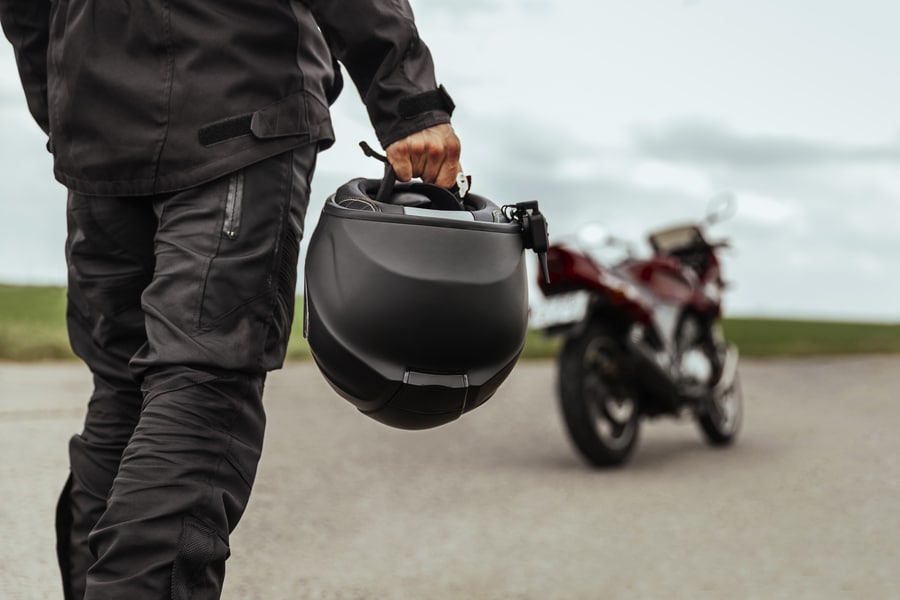Motorcycle Helmet Laws in Maryland

Motorcycle helmet use is not only required by law in Maryland, but it is crucial for safety. The World Health Organization highlights that wearing a helmet is the single most effective way to reduce the risk of severe injury or death in motorcycle accidents. This safety measure is essential, and understanding its significance can help mitigate resistance to helmet laws.
Despite the clear benefits, motorcycle helmet laws in Maryland frustrate some motorcyclists. Given the sense of freedom associated with riding without a helmet, it’s easy to understand their perspective. However, the statistics speak volumes, as helmet use decreases the risk of serious injury by about 70% and the risk of death by around 40%.
Additionally, helmet use significantly reduces healthcare costs. Recognizing these facts, many countries and most U.S. states, including Maryland, have enacted mandatory helmet laws.
Maryland Motorcycle Helmet Laws and Requirements in 2024
Motorcyclists in Maryland must adhere to strict helmet laws to ensure their safety on the road. According to Maryland statutes §21–1306, all riders and passengers are required to wear a helmet that meets the standards established by the U.S. Department of Transportation (DOT). These helmets are designed to provide maximum protection by reducing and dispersing the force from impacts during accidents.
Protective Riding Gear
Maryland law mandates the use of approved eye protection in addition to helmets. Riders must use windscreens, goggles, or face shields that comply with FDA safety standards, ensuring they are impact-resistant and non-tinted during conditions requiring headlight use.
Proper protective riding gear extends beyond helmets and eye protection, emphasizing the importance of full-fingered gloves, long-sleeved jackets, and over-the-ankle boots for comprehensive protection.
The Motorcycle Safety Program strongly recommends wearing protective gear specifically designed for motorcycling. This gear not only safeguards riders in the event of a crash but also provides comfort in various weather conditions. While leather gear offers the most protection, textile riding jackets with mesh material and armor in critical impact areas are preferred for their comfort and versatility. Gloves enhance grip even in adverse conditions, and special riding jeans lined with Kevlar or leather offer durability.
Licensing and Basic Road Rules
Drivers must obtain a Class M license to operate a motorcycle in Maryland. New or inexperienced riders should consult the MVA Motorcycle Operator Manual for detailed guidance. Motorcyclists are subject to the same traffic laws as other drivers, including obeying traffic signals, speed limits, and right-of-way rules. Unique motorcyclist regulations include operating only from the permanent, attached seat and lane-splitting prohibition.
Motorcyclists enjoy the freedom of the open road but must prioritize safety through proper gear and adherence to Maryland’s laws. Bright-colored clothing can enhance visibility, helping to prevent accidents. By following these regulations, riders can ensure their safety and that of others on the road.
What Are Some Legally Approved DOT Helmets for Motorcycle Riders in Maryland?
Maryland requires all motorcycle riders to wear helmets that meet U.S. Department of Transportation (DOT) standards. Here’s a guide to choosing the best DOT-approved helmets and understanding the critical safety features defined by the Federal Motor Vehicle Safety Standard (FMVSS) 218.
Types of Motorcycle Helmets
Full Face Helmet: Offers the best coverage for the head and neck, including the chin. It’s the safest option, providing superior protection against impacts, road debris, and weather conditions.
Modular Helmet: This helmet provides full-face protection with a flip-up chin bar and visor. While convenient, the hinge can be weak, making it slightly less safe than full-face helmets.
Open-face helmet: This helmet covers the top, back, and sides of the head but leaves the face and chin exposed, reducing safety in a crash and offering limited protection against debris and weather.
Half Helmet: Known as “brain buckets,” these provide minimal coverage, protecting only the top of the head and sometimes the back of the neck and ears. They offer less protection but are DOT-approved.
Off-road Helmet: Designed for dirt biking and motocross, these helmets meet DOT standards but are not ideal for road use due to their extended peaks and oversized chin bars.
Dual-Sport (Hybrid) Helmet: This helmet combines the features of a full-face and off-road helmet, offering versatility for various terrains with a larger, aerodynamic visor and lower chin bar.
Critical Safety Features and DOT Standards
Full-face helmets are generally the safest. DOT standards (FMVSS 218) focus on:
- Impact Absorption: Helmets must absorb crash impacts.
- Penetration Resistance: Helmets must prevent sharp objects from penetrating.
- Retention: Straps must withstand tension without breaking.
- Peripheral Vision: Helmets must allow at least 105° peripheral vision.
Helmets should display a DOT label, and additional certifications from Snell or ANSI are beneficial.
What to Look for When Buying a Helmet
- Weight: Safe helmets typically weigh at least three pounds.
- Construction: Look for solid rivets, sturdy chin straps, and minimal protrusions.
- Inner Lining: Should be at least one inch thick and firm.
- Labeling: Ensure the helmet has the manufacturer’s name, model, size, month, year, and materials.
Always Wear Your Helmet
Wearing a helmet significantly reduces the risk of fatal head injuries in a crash. Always wear your helmet, no matter how short the ride or slow the speed, to ensure your safety on the road.
The Dangers of Not Wearing a Helmet While Riding a Motorcycle in Baltimore, Maryland
Riding a motorcycle offers a thrilling sense of freedom, but not wearing a helmet can lead to devastating consequences. Statistics reveal that over 5,000 motorcyclists die annually in the U.S., many of which could have been prevented with proper helmet use.
Helmets are 37% effective in preventing motorcycle driver deaths and 41% effective for passengers. In 2016, 41% of motorcyclists who died were not wearing helmets, and in Indiana, this number rose to 75%.
Without a helmet, riders face a significantly higher risk of severe head injuries, such as traumatic brain injury, concussions, facial fractures, shattered jaws, dental injuries, ear and eye damage, and facial disfigurement. Proper helmet use could save around 802 lives each year, with 1,800 people already surviving crashes due to wearing helmets.
In Maryland, an average of 73 motorcycle riders and passengers die, and nearly 1,046 are injured annually. Motorcyclists are injured in about 72% of crashes involving other vehicles. Motorcycle crashes result in injury or death at more than twice the rate of all other crashes in the state, with incidents peaking from April to October and during weekends and mid-day hours.
Safety experts unanimously agree on the importance of helmets, debunking myths that they impair vision or hearing or increase neck injury risk. The National Highway Traffic Safety Administration states that motorcyclists wearing helmets are three times less likely to suffer fatal head injuries. Ultimately, wearing a properly fitting, DOT-compliant helmet significantly reduces the risk of severe injury or death, making every ride safer.
How Will Not Wearing a Helmet Affect My Motorcycle Accident Injury Claim?
Riding a motorcycle without a helmet in Maryland can have severe consequences, but it won’t necessarily impact your injury claim. Maryland law mandates helmet use for all motorcyclists, but protections are in place to ensure that not wearing a helmet doesn’t automatically affect your legal rights.
Legal Protections for Riders Without Helmets
Maryland law (Md. Code, Transp. Art., § 21-1306) ensures that failure to wear a helmet cannot be used as evidence of negligence or contributory negligence in a lawsuit. This is critical in a contributory negligence state like Maryland, where any fault on your part could prevent you from recovering damages. Fortunately, this statute protects motorcyclists from being penalized simply for not wearing a helmet.
Helmet Use and Court Trials
Under Section 21-1306(e)(1), in most cases, the absence of a helmet cannot be mentioned in court unless the case directly involves the helmet’s design, manufacture, or repair. This means that your decision not to wear a helmet should not be a factor in determining fault or damages in a typical motorcycle accident lawsuit.
Damages and Compensation
Whether you wore a helmet or not does not affect your ability to recover damages if you win your case. Damages can include medical bills, lost wages, pain and suffering, and lost enjoyment of life. Medical expenses often comprise the most significant portion of damages, covering surgeries, therapy, and ongoing treatment costs.
Lost wages account for income you couldn’t earn due to your injuries. Pain and suffering and loss of enjoyment of life address the broader impacts of your injuries on your daily activities and overall well-being.
For instance, if you suffer a head injury in a motorcycle accident, the lack of a helmet cannot be used to reduce your compensation. The focus will be on the accident’s cause and the extent of your injuries. The court will evaluate the defendant’s actions and how they contributed to the accident, not whether you were wearing a helmet.
Seek Legal Advice
If you’ve been in a motorcycle accident in Maryland and weren’t wearing a helmet, seeking legal advice is essential. The law protects your right to pursue compensation, and an experienced Baltimore motorcycle accident lawyer can help you navigate the complexities of your claim, ensuring you receive the maximum possible damages for your injuries. Don’t let the absence of a helmet deter you from seeking the justice and compensation you deserve.
What Are Maryland Helmet Laws for Scooters?
In Maryland, helmet laws extend to motorcycles, scooters, and mopeds. These regulations, which have been in place for many years, mandate that all motor scooter and moped operators adhere to specific safety requirements.
Under Maryland vehicle law, all motor scooters and mopeds must be titled and insured. Also, operators of these vehicles are required to hold a valid driver’s license or a moped operator’s permit.
Additionally, they must wear a helmet and eye protection while riding. This is essential for their safety, as scooters and mopeds, much like motorcycles, offer minimal protection in the event of an accident. Helmets and eye protection can significantly reduce the risk of serious injuries.
Moreover, all motor scooters must display a title decal on the vehicle’s rear. This ensures that the car is registered correctly and can be easily identified if necessary. The requirement for titling and insurance brings scooters and mopeds closer in regulatory terms to larger vehicles, emphasizing the importance of safety and accountability on the road.
The extension of helmet laws to scooters and mopeds aligns with Maryland’s longstanding commitment to road safety. Since 1992, Maryland has required motorcyclists to wear helmets, a regulation that has faced opposition but remains a critical safety measure.
The rationale is clear: in any collision, the size and weight disparity between larger and smaller two-wheeled vehicles can lead to severe injuries for riders. Helmets play a crucial role in mitigating these risks.
Even though Maryland law mandates helmet use, the non-use of helmets is considered inadmissible in court in case of an accident. This principle is similar to the inadmissibility of non-use of seatbelts in car accident cases. The focus remains on the negligence that caused the accident rather than the victim’s failure to wear protective gear.
Experienced Baltimore Motorcycle Lawyer
Having an experienced lawyer is crucial when dealing with the aftermath of a motorcycle accident. In Baltimore, attorney John Leppler stands out as a dedicated advocate for motorcyclists. With years of experience handling motorcycle accident claims, John understands these case’s unique challenges.
His expertise spans negotiating with insurance companies to representing clients in court, ensuring they receive the compensation they deserve for injuries, medical expenses, lost wages, and pain and suffering.
Unlike large mega-firms, John takes a personalized approach. He is never too busy to speak with you directly and answer any questions about your case. This personal attention ensures you are fully informed and comfortable with the legal process.
If you or a loved one has been involved in a Baltimore motorcycle accident, reach out to Leppler Injury Law. John’s extensive experience and genuine care for his clients make him the ideal choice. Contact Leppler Injury Law today to schedule a free consultation.







